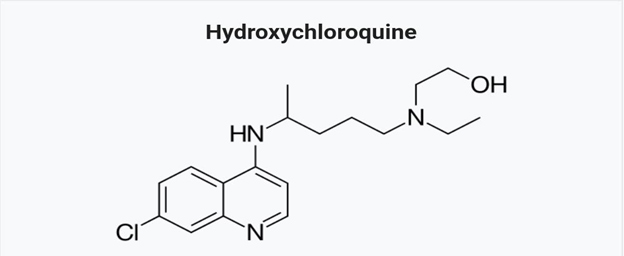Student contributors: Rituja Mahalanobish and Ankita Dev (B. Tech Biotechnology)
Hydroxychloroquine is an antimalarial drug that inhibits microorganisms, cellular replication. In recent time COVID 19 is life-threatening disease create pandemic problem in the whole world. Hydroxychloroquine/chloroquine is currently being studied for the treatment and prevention of SARS COVID 2. Mechanism of Hydroxychloroquine and chloroquine both are the same only differ an extra hydroxyl group present in hydroxychloroquine. But the treatment of Covid-19, hydroxychloroquine is more-safer than chloroquine.

Mechanism
Previous experimental studies had demonstrated that hydroxychloroquine /chloroquine has efficient to fight against SARS COVID 1 in vitro. It inhibits or blocks the glycosylation receptor of the cell surface, so the virus cannot bind to the Angiotensin-Converting Enzyme (ACE) 2 which expresses in lungs, heart, kidney intestine. Hydroxychloroquine/chloroquine can interfere with the SARS COVID 2 binding with the ACE 2 receptor.Hydroxychloroquine/chloroquine stops the biosynthesis of sialic acid by inhibiting the quinine reductase 2. Sialic acid is monosaccharides of cell transmembrane which help to ligand recognition. So, SARS COVID 2 cannot bind with the receptors by inhibiting sialic acid biosynthesis. This drug stops the transport and post transport system of Coronavirus. Hydroxychloroquine through inhibition of map kinase interferes with SARS COVID 2 crosstalk. Hydroxychloroquine/chloroquine inhibits the endocytosis. These drugs both can change pH in intracellular organelles. It can decrease the acidic medium in the endosome and lysosome by the increasing pH level. Any type of virus can be rapidly activated in an acidic medium. Hydroxychloroquine drug stops the fusion between lysosome and endosome and makes them dysfunctional. Spike protein is not cleaved by inhibiting cell fusion mechanism. Hydroxychloroquine has an anti-cancer effect and it works as an antiviral agent. It helps to the influx of Zinc into the cells. Hydroxychloroquine/chloroquine mediated Zinc transport into the cell help to increase the amount of zinc into the cytosol. Zinc inhibits RNA dependent RNA polymerase or RDRP enzyme mechanism. RDRP enzyme helps to make viral RNA and help to replicate the virus. Hydroxychloroquine has immune modulators. It prevents autoimmune disorder by suppressing the autoimmune response. It works as an interferon blocker reducing the immune system response to a viral infection. It also inhibits the synthesis of inflammatory cytokines to prevent cytokine storm. Hydroxychloroquine is less penetrable to the blood retinal barrier because it has an extra hydroxyl group. The retinal toxicity is less compared to chloroquine. Hydroxychloroquine is a derivative of chloroquine which is less toxic.
Present researches and scenario of Hydroxychloroquine:
Several studies conducted by researchers have shown that hydroxychloroquine, an antimalarial drug found to be more effective than the standard treatment. Drug research conducted on 30 Covid-19 patients, shows 13 patients tested negative on whom tested compared to 14 patients who were not on this drug though one patient develops a serious illness. Whereas the median time taken for the individuals to recover was similar in both groups. However, according to Thailand Medical News warned all concern not to acquire any experimental drugs or TCM (Traditional Chinese Medicine) herbs and use them by themselves. Researchers recommended taking suggestions from an authorized doctor otherwise it could result in complex medical conditions and life-threatening risk. A study published by French medical journal provides new confirmation that hydroxychloroquine does not appear to help the immune system, clear the coronavirus from the body. Studies found that a combination of Hydroxychloroquine and Azithromycin benefits patients who do not have severe symptoms of this virus.
However, Hydroxychloroquine has also been treated with other drugs such as Azithromycin+ Hydroxychloroquine, Chloroquine+ Hydroxychloroquine. Also remarkably, it can have dangerous side effects, as well as giving people illusions about the drug, because the drug is still under research for treatment of Covid-19 patients. Side effects of Hydroxychloroquine:
The common side effects of hydroxychloroquine:
1. Headache, dizziness, ringing in ears
2. Nausea, vomiting, stomach pain
3. Loss of appetite, weight loss
4. Mood changes, feeling nervous or irritable
5. Skin rash or itching
6. Hair loss As per recent reports by the FDA (Food & Drug Administration), warned the providers that Covid-19 patients could experience life-threatening side effects while taking chloroquine & hydroxychloroquine. It says the side effects include abnormal heart rhythms.
FDA has reported that chloroquine & hydroxychloroquine has negative side effects, used for Covid-19 patients. The drug has not been proven to successfully treat Covid-19 in large medical experiments. Further, researchers have expressed their concern about acclaiming the drug as a potential treatment for Covid-19. Patients with heart problems & other fundamental medical conditions have a high risk of undergoing negative side effects from hydroxychloroquine.
REFERENCES:
• Hydroxychloroquine: Can the anti-malarial drug contain COVID-19? Published by The Hindu Net Desk CHENNAI, APRIL 08, 2020
• Awadhesh Kumar Singh, Akriti Singh, Altamash Shaikh, Ritu Singh, and Anoop Misra Chloroquine and hydroxychloroquine in the treatment of COVID-19 with or without diabetes: A systematic search and a narrative review with a special reference to India and other developing countries, Diabetes Metab Syndr. 2020 May-June; 14(3): 241–246.
• Liu, J., Cao, R., Xu, M. et al. Hydroxychloroquine, a less toxic derivative of chloroquine, is effective in inhibiting SARS-CoV-2 infection in vitro. Cell Discov 6, 16 (2020).
Visited 1404 times, 1 Visit today



